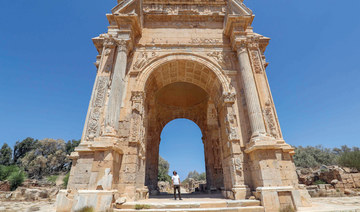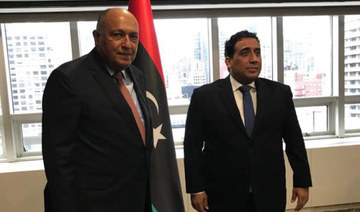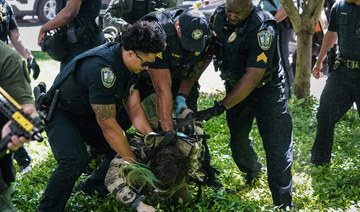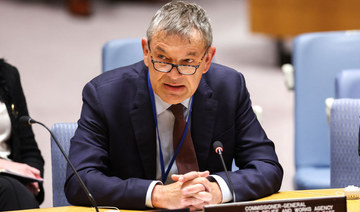NEW YORK: Libya’s efforts to heal after 10 years of war will require not only a national reconciliation, but also an international reconciliation between the Libyan people and the global community.
That is the view of Taher Elsonni, Libya’s permanent representative to the UN, who on Monday reiterated his country’s demand for an end to external interference and the withdrawal of all foreign forces and mercenaries.
“Enough is enough,” he said during an exclusive interview with Arab News. “Libyans are tired of 10 years of chaos.
“As much as we talk about national reconciliation, there should also be international reconciliation. As much as we talk about confidence building, there should be confidence building between the international community and Libyans — and that starts with the simultaneous withdrawal of all foreign fighters and mercenaries, and support for the will of Libyans when they go through the electoral process.”
Libyans have been killed and their country ravaged by thousands of foreign fighters recruited by the rival forces in the country. As long as Libya’s “free will” is held hostage by these armed groups and their foreign sponsors, Elsonni said, conflicts will continue to rage in the country at a time when the proliferation of such proxy wars is causing instability across the region.
The rebels who killed Chadian President Idriss Deby in April, for example, were based in Libya, where they amassed money, accessed advanced weaponry and gained battlefield experience as guns-for-hire.
“The challenge with mercenaries is that no one acknowledges their presence,” said Elsonni.
The UN-brokered Libyan ceasefire agreement in October 2020 included a call for all 20,000 mercenaries and foreign fighters to withdraw from the country within three months. But when the UN Security Council discussed ways of repatriating them, observers noted that some council members were fueling the problem.
For example, Russia’s support for the Libyan National Army includes mercenaries from Russian private security company Wagner Group. Turkey, meanwhile, provided transport for thousands of Syrians to fight in Tripoli, paid them salaries and offered promises of Turkish citizenship. Other mercenaries operating in Libya hail from South Africa, the US, the UK, Australia and about 30 additional countries.
Meanwhile, Libyans attempt to navigate this sinister foreign presence as they walk an already tricky path toward national reconciliation, and attempt to consolidate the many small victories achieved in the past year as part of the political process.
These achievements — which paved the way for a ceasefire and the formation of an interim unity government tasked with shepherding the nation toward parliamentary and presidential elections scheduled for December — would not have been possible without both Libyans and foreign powers reaching the conclusion that no one could win the war through military might, according to Elsonni.
“Everything was tried, and in the end everyone was convinced that there can be no military solution,” he said.
He conceded that all countries in the region are entitled to be concerned about preserving their security and national interests, but added: “You don’t need to intervene and interfere the way you did in order to have a stabilized region (and) boost the economy.
“Libya is a hub between Africa and Europe, East and West. Libyans are known for their modesty. I can no longer say Libya is a rich country, but it does have the means and the resources to come back, and with Libya stabilized we can find win-win deals that will satisfy everyone’s national interests as much as possible.
“So, let’s work together, put the past behind us and start a new phase. And let’s not provide an excuse for terrorism and extremism, which feeds on this chaos and perpetuates the conflict.”
The road to the national elections planned for December has been paved with as much fear as hope among Libyans.
Although the new Presidency Council managed to unify civilian executive bodies, the military remains fractured. Some fear that winners with weapons might start another war.
In the absence of a clear constitutional framework setting out the responsibilities of a new president, “who can guarantee that Libyans will not find themselves in the grip of yet another dictator?” asked Elsonni.
“There is a group of people that don’t want to lose the power they have today, so they are maneuvering and finding excuses for the elections not to happen,” he added.
“There are also those who fear losing power by having a high-level executive office, in the form of a president, that might lead to them losing popularity. Some want only parliamentary elections, and think a safer option is to have a steady state and give more time to the constitutional framework to be developed.
“And, finally, you have Libyans on the ground who are fed up with all the attempts of the past and want Libya as a state to have separation of power.
“The challenge in this last one is to have an ‘inclusive’ president, not one who has revenge in mind, because those who have ambitions to be president are all affiliated to a certain group, and so that is scaring people.”
All of the fears people have are valid, said Elsonni.
“But what are the alternatives that we have today?” he asked. “If I name all the obstacles that we face today, one would conclude that the risk of the elections not happening is high.”
Even if they do go ahead, he said, challenges will remain — but they at least offer the hope for change and a better future.
“Anyone who thinks elections will solve all of Libya’s problems is naive,” he said. “But we have had a sick patient for the past 10 years and we have been using the same medicine.
“Now we have the option of a new medicine in the form of elections. We are not sure how that will unfold — it’s a 50/50 risk. But a certain level of legitimate representation will get the ball rolling.”
Meanwhile, Elsonni said, national reconciliation remains “the foundation for any permanent peace in Libya.”
From the establishment of a High Commission for Reconciliation to the release, albeit symbolic, of some prisoners, there have been steps taken in the right direction.
Elsonni stressed the importance of “transitional justice” as a means toward lasting reconciliation and true healing of the nation.
“For there to be a comprehensive national reconciliation, truth needs to be revealed, and apologies issued,” he said.
Although he admitted that the responsibility for reconciliation ultimately lies primarily with the Libyan people themselves, Al-Sonni questioned the lack of useful international support for the efforts.
The ambassador, who was a UN staffer for 17 years and so is familiar with the organization’s methodologies, criticized the UN for adopting a “top-down approach” to Libya, which he said has undermined the role of civil society.
“If you follow all the dialogue that took place, they were all technical discussions that tackled military, political and economical challenges, but there was no national reconciliation track,” he said.
“There is also a lack of understanding of the Libyan context by the international community. For Libya to become a success story, we need to adopt a bottom-top approach, work on civil society and try to get the best of the tribal structure that links Libyans together.
“Some have tried to use our tribal structure as a way to fuel the war. But having tribes is not a bad thing. In fact, it is a golden key, I call it, which can lead us to peace if we use it correctly.”
Inclusivity is another important aspect to the process. Elsonni took part in the Sukhairat dialogue in 2015, and was one of the signatories to the final agreement for the formation of a national unity government.
“Not all parties who really had power on the ground were represented,” he said. “Many were completely excluded, such as the ex-regime loyalists.”
He warned that such “exclusion in any post-conflict reconciliation is one of the biggest mistakes you could make. It is a fatal error.”
Exclusion can also happen in the form of centralized governance, Elsonni said, which can, for example, cause people living outside of Tripoli, where much of the wealth is concentrated, to feel excluded.
Despite all these challenges, however, Elsonni is pinning his hopes on the next generation of Libyan youth.
“The only people who will solve this are our young people,” he said. “They are vocal and much more aware than their elders. The problem is that they still lack coordination and leadership.”
Elsonni also addressed allegations of flagrant abuses of human rights in Libyan detention centers. While he expressed regret over the fact that his country has become a place where “innocent people die,” he denied any accusation of systemic torture. Once again he pleaded with the international community to “help us make Libya stable and these issues will be resolved.”
He added: “We’re totally against such violations and we’re working hard to fix the system and protect the most vulnerable. But there is a difference between a government that doesn’t care and one that really tries, and sees this as a priority, but is spread thin with all the other different challenges and has resource problems.
“The problem is the hypocrisy of the West, and their unwillingness to devise a comprehensive solution for the migrant crisis. You cannot blame a country in conflict for what happens within it when it comes to migrants. Migrants who come to Libya aim to continue to Europe. Nobody wants to live in the hellfire of conflict, that goes without saying.”
Condemning the “double standards” of the international community, he said: “They ask us to accommodate those migrants when they know our resources are stretched thin. They ask us to shut down detention centers but they won’t tell us what to do with migrants who enter illegally, or those who are arrested at sea and pushed back to Libya.
“If you really care about migrants, then agree on a quota also and take in some of them.
“The countries that are being most forceful with Libya on this issue are the same ones that are shutting their doors to migrants. One such country literally took in four or five migrants out of the thousands that are trying to cross.
“The problem is bigger: it is EU competition between countries, and we know it. You want to blame us? Blame yourself first.”
‘Leave us alone to heal,’ Libya’s UN envoy tells foreign powers
https://arab.news/67ss5
‘Leave us alone to heal,’ Libya’s UN envoy tells foreign powers
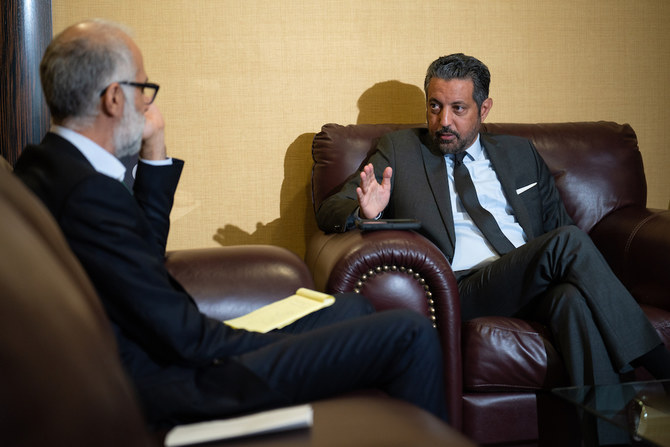
- In an exclusive interview with Arab News, Taher Elsonni highlights the challenges facing Libya and how foreign powers are making them worse
- In addition to national reconciliation there is a need for international reconciliation between the international community and Libyans, he said.
Lawyer for arrested Palestinian academic warns move could set ‘precedent’ for free speech in Israel
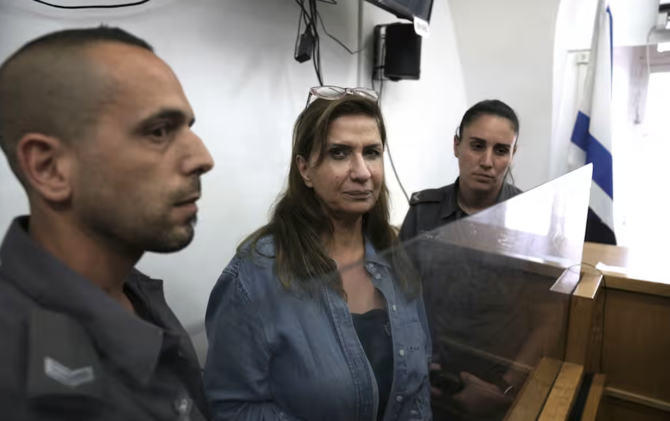
- Nadera Shalhoub-Kevorkian was detained for appearing on podcast to discuss state violence, genocide
- Hundreds of Palestinian citizens of Israel have been detained since Oct. 7 over criticism of Israel
LONDON: The lawyers for a Palestinian legal scholar arrested on April 17 have said her detention was “political” and could set a “precedent” for the treatment of academics and free speech in Israel.
Prof. Nadera Shalhoub-Kevorkian, a leading feminist academic with roles at the Hebrew University of Jerusalem and Queen Mary, University of London, was arrested after appearing on a podcast in March in which she discussed her work on state crimes, genocide, violence and surveillance in the context of the war in Gaza.
She was strip-searched by police, interrogated and denied access to food, water and medication for several hours, and held in a cold cell overnight before being bailed the next day. A number of her personal items, including posters and books, were also confiscated.
Hassan Jabareen, her lawyer and director of human rights organization Adalah, said: “This is not only about one professor, it could be a (precedent) for any academic who goes against the consensus in wartime.”
Israeli police claimed that she was being investigated on suspicion of incitement to terrorism, violence and racism, but a magistrate deemed she did not pose a threat after she was arrested, leading to her release.
Hundreds of Palestinian citizens of Israel have been arrested since the outbreak of hostilities after Oct. 7, with many detained for criticism of Israel.
All arrests in relation to freedom of speech issues must be signed off by Israel’s attorney general, and Shalhoub-Kevorkian has been ordered to return to face further questioning at the weekend.
Jabareen said: “They could have asked her to come to the police station for two or three hours to discuss, investigate.
“To carry out the arrest like that, as if she was a dangerous person, shows the main purpose was to humiliate her.
“It was illegal, that’s why the magistrates court accepted my argument that she should be released and the district court confirmed it.”
She added: “If they indict her, this might have a deeply chilling effect. It’s very difficult to prosecute a person for academic work … but the political situation in Israel is starting to not really be based on the rule of law.”
International academics have condemned Shalhoub-Kevorkian’s arrest and treatment, with over 100 colleagues from the Hebrew University of Jerusalem publishing a letter in support of her.
In addition, 250 academics at Queen Mary have signed a separate letter saying: “Academic freedom (in Israel) has come under sustained attack.”
In the Hebrew University academics’ letter, published by Israeli newspaper Haaretz, her colleagues said: “Regardless of the content of Nadera’s words, their interpretation and the opinions she expressed, it is clear to everyone that this is a political arrest, the whole purpose of which is to gag mouths and limit freedom of expression. Today it is Nadera who stands on the bench, and tomorrow it is each and every one of us.”
The Hebrew University also issued a short statement of support, despite the fact that in 2023 she was briefly suspended and asked to resign by the university’s rector after she called for a ceasefire in Gaza and suggested Israel could be guilty of genocide.
“We strongly object to many of the things that Prof. Shalhoub-Kevorkian said. Nonetheless, as a democratic country, there is no place to arrest a person for such remarks, however infuriating they may be,” it said.
Gaza baby rescued from dead mother’s womb dies

- Doctors were able to save the baby, delivering her by Caesarean section
- The baby suffered respiratory problems and a weak immune system, said Doctor Mohammad Salama who had been caring for Sabreen Al-Rouh
RAFAH, Gaza Strip: A baby girl who was delivered from her dying mother’s womb in a Gaza hospital following an Israeli airstrike has herself died after just a few days of life, the doctor who was caring for her said on Friday.
The baby had been named Sabreen Al-Rouh. The second name means “soul” in Arabic.
Her mother, Sabreen Al-Sakani (al-Sheikh), was seriously injured when the Israeli strike hit the family home in Rafah, the southernmost city in the besieged Gaza Strip, on Saturday night.
Her husband Shukri and their three-year-old daughter Malak were killed.
Sabreen Al-Rouh, who was 30-weeks pregnant, was rushed to the Emirati hospital in Rafah. She died of her wounds, but doctors were able to save the baby, delivering her by Caesarean section.
However, the baby suffered respiratory problems and a weak immune system, said Doctor Mohammad Salama, head of the emergency neo-natal unit at Emirati Hospital, who had been caring for Sabreen Al-Rouh.
She died on Thursday and her tiny body was buried in a sandy graveyard in Rafah.
“I and other doctors tried to save her, but she died. For me personally, it was a very difficult and painful day,” he told Reuters by phone.
“She was born while her respiratory system wasn’t mature, and her immune system was very weak and that is what led to her death. She joined her family as a martyr,” Salama said.
More than 34,000 Palestinians, many of them women and children, have been killed in the six-month-old war in Gaza between Israel and Hamas militants, according to the Gaza health ministry. Israel denies deliberately targeting civilians in its campaign to eradicate Hamas.
Much of Gaza has been laid to waste by Israeli bombardments and most of the enclave’s hospitals have been badly damaged, while those still operating are short of electricity, medicine sterilization equipment and other supplies.
“(Sabreen Al-Rouh’s) grandmother urged me and the doctors to take care of her because she would be someone that would keep the memory of her mother, father and sister alive, but it was God’s will that she died,” Salama said.
Her uncle, Rami Al-Sheikh Jouda, sat by her grave on Friday lamenting the loss of the infant and the others in the family.
He said he had visited the hospital every day to check on Sabreen Al-Rouh’s health. Doctors told him she had a respiratory problem but he did not think it was bad until he got a call from the hospital telling him the baby had died.
“Rouh is gone, my brother, his wife and daughter are gone, his brother-in-law and the house that used to bring us together are gone,” he told Reuters.
“We are left with no memories of my brother, his daughter, or his wife. Everything was gone, even their pictures, their mobile phones, we couldn’t find them,” the uncle said.
UN denounces ‘more serious’ Iran crackdown on women without veils

- Hundreds of businesses including restaurants and cafes have been shut down for not enforcing the hijab rule
- More women began refusing the veil in the wake of the 2022 death in custody of 22-year-old Mahsa Amini
GENEVA: The United Nations said Friday that it was concerned by reports of new efforts to track and punish Iranian women, some as young as 15, who refuse to wear the headscarf required under the country’s Islamic law.
The UN Human Rights Office also expressed alarm about a draft bill on “Supporting the Family by Promoting the Culture of Chastity and Hijab,” which would impose tougher sentences on women appearing in public without the hijab.
“What we have seen, what we’re hearing is, in the past months, that the authorities, whether they be plainclothes police or policemen in uniform, are increasingly enforcing the hijab bill,” Jeremy Laurence, a spokesman for the office, said at a press conference.
“There have been reports of widespread arrests and harassment of women and girls — many between the ages of 15 and 17,” he said.
Iranian police announced in mid-April reinforced checks on hijab use, saying the law was increasingly being flouted.
Hundreds of businesses including restaurants and cafes have been shut down for not enforcing the hijab rule, and surveillance cameras are being used to identify women without it, Laurence said.
More women began refusing the veil in the wake of the 2022 death in custody of 22-year-old Mahsa Amini after her arrest by Iran’s morality police for allegedly breaking the headscarf law, which sparked a wave of deadly protests against the government.
Laurence said that on April 21, “the Tehran head of the Islamic Revolutionary Guard Corps announced the creation of a new body to enforce existing mandatory hijab laws, adding that guard members have been trained to do so ‘in a more serious manner’ in public spaces.”
And while the latest draft of the new hijab bill has not been released, “an earlier version stipulates that those found guilty of violating the mandatory dress code could face up to 10 years’ imprisonment, flogging, and fines,” he said, adding that “this bill must be shelved.”
The Human Rights Office also called for the release of a rapper sentenced to death for supporting nationwide protests sparked by Amini’s death.
Toomaj Salehi, 33, was arrested in October 2022 for publicly backing the uprising.
“All individuals imprisoned for exercising their freedom of opinion and expression, including artistic expression, must be released,” Laurence said.
UN seeks to deescalate Sudan tensions amid reports of possible attack

- UN Secretary-General Antonio Guterres’ envoy is engaging with all parties to deescalate tensions
UNITED NATIONS: The United Nations is increasingly concerned about escalating tensions in Al-Fashir in Sudan’s North Dafur region amid reports that the Rapid Support Forces are encircling the city, signaling a possible imminent attack, the UN’s spokesperson said on Friday.
UN Secretary-General Antonio Guterres’ envoy is engaging with all parties to deescalate tensions in the area, the spokesperson said.
Israeli army says missile fire kills civilian near Lebanon

- The violence has fueled fears of all-out conflict between Iran-backed Hezbollah and Israel
- “Overnight, terrorists fired anti-tank missiles toward the area of Har Dov in northern Israel,” the Israeli army said
JERUSALEM: The Israeli army said Friday a civilian was killed near the country’s northern border with Lebanon, as near-daily exchanges of fire with Hezbollah rage.
Both sides have stepped up attacks this week, with Hezbollah increasing rocket fire and Israel saying it had carried out “offensive action” across southern Lebanon.
The violence has fueled fears of all-out conflict between Iran-backed Hezbollah and Israel, which last went to war in 2006.
“Overnight, terrorists fired anti-tank missiles toward the area of Har Dov in northern Israel,” the Israeli army said, referring to the disputed Shebaa Farms district.
“As a result, an Israeli civilian doing infrastructure work was injured and he was later pronounced dead.”
Israeli media reported that the victim was an Arab-Israeli truck driver. Police told AFP they had not identified the body, but said it was the only one found after a truck was hit.
Hezbollah said it had destroyed two Israeli vehicles in the Kfarshuba hills overnight in a “complex ambush” on a convoy using missiles and artillery.
The Israeli army did not comment directly on the claim.
It said Israeli fighter jets struck Hezbollah targets around Shebaa village in southern Lebanon including a weapons store and a launcher, while soldiers “fired to remove a threat in the area.”
It said fighter jets also “struck Hezbollah operational infrastructure in the area of Kfarshuba and a military compound in the area of Ain El Tineh in southern Lebanon.”
Lebanon’s official National News Agency reported that Shebaa village, Kfarshuba and Helta were targeted by “more than 150 Israeli shells,” leaving homes damaged.
Iran-backed Hezbollah has been trading almost-daily fire with the Israeli army since the day after its Palestinian ally Hamas carried out an unprecedented attack on Israel on October 7.
Since October 8 at least 380 people have been killed in Lebanon, including 252 Hezbollah fighters and dozens of civilians, according to an AFP tally.
Israel says 11 soldiers and nine civilians have been killed on its side of the border.
Tens of thousands of people have been displaced on both sides.


